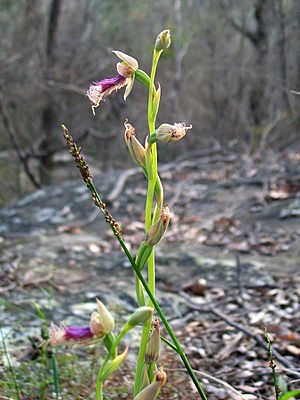Purple beard orchid facts for kids
Quick facts for kids Purple beard orchid |
|
|---|---|
 |
|
| Calochilus robertsonii in Lane Cove National Park | |
| Scientific classification | |
| Genus: |
Calochilus
|
| Species: |
robertsonii
|
| Synonyms | |
|
|
The Purple Beard Orchid (scientific name: Calochilus robertsonii) is a beautiful type of orchid. It is found naturally in Australia and New Zealand. This orchid has one dark green leaf. It can grow up to nine flowers that are green or brown with reddish or purplish stripes. A special part of the flower, called the labellum, looks like it has a shiny purple, mauve, or bronze beard. It also has a small ridge between two "eye" spots.
What it Looks Like
The Purple Beard Orchid is a plant that grows from the ground. It is a perennial plant, which means it lives for more than two years. It also loses its leaves in some seasons (it's deciduous). This plant has a fleshy, dark green leaf that is shaped like a spear. The leaf can be about 150 to 400 mm (6 to 16 inches) long and 8 to 12 mm (0.3 to 0.5 inches) wide.
Unlike some other orchids, its leaf is fully grown when the flowers appear. The orchid grows a flowering stem that is 150 to 450 mm (6 to 18 inches) tall. This stem can hold up to nine flowers. These flowers are green to brown and have reddish or purplish stripes.
The top part of the flower, called the dorsal sepal, is about 12 to 15 mm (0.5 to 0.6 inches) long. The side sepals are similar in length but a bit narrower. The petals are about 7 to 9 mm (0.3 to 0.4 inches) long.
The labellum is flat and measures 20 to 35 mm (0.8 to 1.4 inches) long. It has short, purplish bumps near its base. The middle part of the labellum has thick, mauve, purple, or bronze-colored hairs. These hairs can be up to 5 mm (0.2 inches) long. The very tip of the labellum has a small, tail-like part. This "tail" is 5 to 10 mm (0.2 to 0.4 inches) long.
The column of the flower has two purple "eyes." These "eyes" are connected by a clear ridge. Purple Beard Orchids usually bloom from August to early December.
How it Got its Name
The Purple Beard Orchid was first officially described in 1873. A botanist named George Bentham wrote about it in a book called Flora Australiensis.
The scientific name, robertsonii, was chosen to honor John George Robertson. He was a person who collected the first example of this orchid. This first example is called the "type specimen."
Where it Grows
The Purple Beard Orchid is very common and can be found in many places in eastern Australia. It grows in different types of areas. You can find it in open heathlands, forests, and scrublands. It grows from the coast all the way up into the mountains.
In Australia, it is found in Queensland, starting south of Gympie. It also grows in coastal areas and inland parts of New South Wales, reaching as far as Condobolin. You can also see it in most of Victoria, South Australia, the Australian Capital Territory, and Tasmania.
In New Zealand, C. robertsonii mainly grows on the North Island. However, one plant was found on the northern tip of the South Island in 1965.

